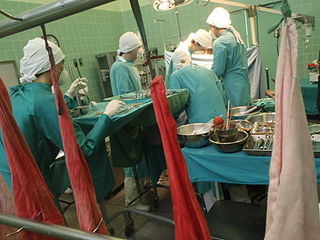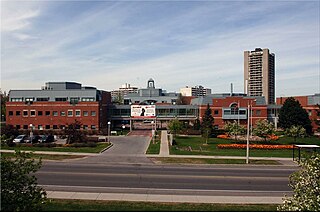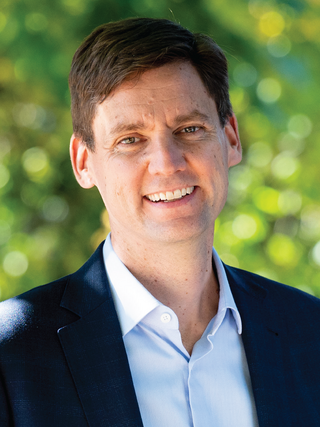
Organ donation is the process when a person authorizes an organ of their own to be removed and transplanted to another person, legally, either by consent while the donor is alive, through a legal authorization for deceased donation made prior to death, or for deceased donations through the authorization by the legal next of kin.

Organ transplantation is a medical procedure in which an organ is removed from one body and placed in the body of a recipient, to replace a damaged or missing organ. The donor and recipient may be at the same location, or organs may be transported from a donor site to another location. Organs and/or tissues that are transplanted within the same person's body are called autografts. Transplants that are recently performed between two subjects of the same species are called allografts. Allografts can either be from a living or cadaveric source.

Canadian Blood Services is a non-profit charitable organization that is independent from the Canadian government. The Canadian Blood Services was established as Canada's blood authority in all provinces and territories except for Quebec in 1998. The federal, provincial and territorial governments created the Canadian Blood Services through a memorandum of understanding. Canadian Blood Services is funded mainly through the provincial and territorial governments.
Eye banks recover, prepare and deliver donated eyes for cornea transplants and research. The first successful cornea transplant was performed in 1905 and the first eye bank was founded in 1944. Currently, in the United States, eye banks provide tissue for over 80,000 cornea transplants each year to treat conditions such as keratoconus and corneal scarring. In some cases, the white of the eye (sclera) is used to surgically repair recipient eyes. Unlike other organs and tissues, corneas are in adequate supply for transplants in the United States, and excess tissue is exported internationally, where there are shortages in many countries, due to greater demand and a less-developed eye banking infrastructure.

The United Network for Organ Sharing (UNOS) is a non-profit scientific and educational organization that administers the only Organ Procurement and Transplantation Network (OPTN) in the United States, established by the U.S. Congress in 1984 by Gene A. Pierce, founder of United Network for Organ Sharing. Located in Richmond, Virginia, the organization's headquarters are situated near the intersection of Interstate 95 and Interstate 64 in the Virginia BioTechnology Research Park.

The Insurance Corporation of British Columbia (ICBC) is a provincial Crown corporation in British Columbia providing vehicle insurance. ICBC was created in 1973 by the NDP government of Premier Dave Barrett.
NHS Blood and Transplant is an executive special health authority of the United Kingdom's Department of Health and Social Care. It was established on 1 October 2005 to take over the responsibilities of two separate NHS agencies: UK Transplant, founded by Dr. Geoffrey Tovey in 1972, and the National Blood Service. Its remit is to provide a reliable, efficient supply of blood, organs and associated services to the NHS. Since NHSBT was established, the organisation has maintained or improved the quality of the services delivered to patients, stabilised the rising cost of blood, and centralised a number of corporate services.

Organ transplantation in China has taken place since the 1960s, and is one of the largest organ transplant programmes in the world, peaking at over 13,000 liver and kidney transplants a year in 2004.
The Fraser Health Authority (FHA) is one of five regional public health authorities in British Columbia. It is governed by the provincial Health Authorities Act.

The National Organ Transplant Act (NOTA) of 1984 is an Act of the United States Congress that created the framework for the organ transplant system in the country. The act provided clarity on the property rights of human organs obtained from deceased individuals and established a public-private partnership known as Organ Procurement and Transplantation Network (OPTN). The OPTN was given the authority to oversee the national distribution of organs.
The Healthcare Systems Bureau is part of the Health Resources and Services Administration (HRSA), of the United States Department of Health and Human Services.

Royal Columbian Hospital (RCH) is among the oldest hospitals in British Columbia and one of the busiest in the Fraser Health Authority. It is located in New Westminster overlooking the Fraser River and is the only hospital in the Lower Mainland that is immediately adjacent to a Skytrain station (Sapperton).
The Ontario Online Donor Registry is a website where Ontario residents, age 16 and older, can register their consent to be an organ and tissue donor. This registry was created to help ease questions and ambiguities with organ donor wishes. The virtual registry also increases Ontario donations with increased accessibility. The registration process can be done through beadonor.ca. Online donor registries have also become popular in the United States, where one can register through Donate Life America; Malaysia, registering through their National Transplant Registry; and Saudi Arabia, registering through the Saudi Center for Organ Transplantation.

David Robert Patrick Eby is a Canadian politician and lawyer who has been serving as the 37th and current premier of British Columbia since November 18, 2022, and has been serving as the leader of the British Columbia New Democratic Party (NDP) since October 21, 2022. A member of the Legislative Assembly of British Columbia, Eby has represented the riding of Vancouver-Point Grey since 2013. From 2017 to 2022, he served in the John Horgan cabinet as attorney general.

The Human Transplantation (Wales) Act 2013 is an act of the National Assembly for Wales, passed in July 2013. It permits an opt-out system of organ donation, known as presumed consent, or deemed consent. The act allows hospitals to presume that people aged 18 or over, who have been resident in Wales for over 12 months, want to donate their organs at their death, unless they have objected specifically. The act varies the Law of England and Wales in Wales, which relied on an opt-in system; whereby only those who have signed the NHS organ donation register, or whose families agreed, were considered to have consented to be organ donors.

MOHAN Foundation is a not-for-profit, registered non-government charity organisation in India that works in the field of deceased organ donation and transplantation. MOHAN is an acronym for Multi Organ Harvesting Aid Network. It has offices in Chennai, Hyderabad, Bengaluru, Delhi, Mumbai, Chandigarh, Nagpur, Jaipur and information centers at Kerala and Imphal.
Organ donation is when a person gives their organs after they die to someone in need of new organs. Transplantation is the process of transplanting the organs donated into another person. This process extends the life expectancy of a person suffering from organ failure. The number of patients requiring organ transplants outweighs the number of donor organs available.
The Trillium Gift of Life Network was an agency of the Government of Ontario responsible for the province's organ donation strategy, promotion, and supply. Ronnie Gavsie was the President & CEO. The agency maintained the popular BeADonor.ca website. It was subsequently subsumed under Ontario Health in 2019.
Organ transplantation in the Indian state of Tamil Nadu is regulated by India's Transplantation of Human Organs Act, 1994 and is facilitated by the Transplant Authority of Tamil Nadu (TRANSTAN) of the Government of Tamil Nadu and several NGOs. Tamil Nadu ranks first in India in deceased organ donation rate at 1.8 per million population, which is seven times higher than the national average.
Organ donation in India is regulated by the Transplantation of Human Organs and Tissues Act, 1994. The law allows both deceased and living donors to donate their organs. It also identifies brain death as a form of death. The National Organ and Tissue Transplant Organisation (NOTTO) functions as the apex body for activities of relating to procurement, allotment and distribution of organs in the country.










